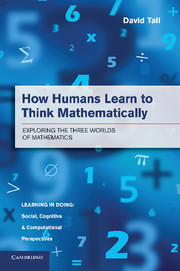Book contents
- Frontmatter
- Dedication
- Contents
- Series Foreword
- Journeys through three worlds of mathematics
- Preface
- Acknowledgements
- Illustration Credits
- I Prelude
- II School Mathematics and Its Consequences
- 2 The Foundations of Mathematical Thinking
- 3 Compression, Connection and Blending of Mathematical Ideas
- 4 Set-Befores, Met-Befores and Long-Term Learning
- 5 Mathematics and Emotion
- 6 The Three Worlds of Mathematics
- 7 Journeys through Embodiment and Symbolism
- 8 Problem Solving and Proof
- III Interlude
- IV University Mathematics and Beyond
- Appendix Where It All Came From
- References
- Index
5 - Mathematics and Emotion
from II - School Mathematics and Its Consequences
Published online by Cambridge University Press: 05 June 2014
- Frontmatter
- Dedication
- Contents
- Series Foreword
- Journeys through three worlds of mathematics
- Preface
- Acknowledgements
- Illustration Credits
- I Prelude
- II School Mathematics and Its Consequences
- 2 The Foundations of Mathematical Thinking
- 3 Compression, Connection and Blending of Mathematical Ideas
- 4 Set-Befores, Met-Befores and Long-Term Learning
- 5 Mathematics and Emotion
- 6 The Three Worlds of Mathematics
- 7 Journeys through Embodiment and Symbolism
- 8 Problem Solving and Proof
- III Interlude
- IV University Mathematics and Beyond
- Appendix Where It All Came From
- References
- Index
Summary
This chapter considers how mathematical thinking affects and is affected by the emotions. At one extreme is the delight of having the power to solve a tricky problem, and at the other is the anxiety of being unable to do mathematics under pressure or even being unable to do mathematics at all. In this chapter we consider the possible sources of this range of emotions, both in terms of the general literature and in terms of the theoretical framework formulated in this book.
Extensive research into mathematics anxiety, particularly in the United States, reveals a range of possible sources, including personal attributes of confidence or insecurity; the attitudes of parents, teachers and peers; inadequate teaching; or poor preparation for examinations. These are all taken into account in the discussion that follows, with the main focus on the individual’s relationship with the mathematics itself.
The path to long-term development of flexible thinking is not the same for everyone. We saw in Chapter 2 that there is already a ‘proceptual divide’ between those who remain fixed in the rigid procedures of counting while others remember known facts and use them to derive other facts with greater fluency. In Chapter 4 we saw how successive experiences in mathematics involve both supportive aspects that encourage generalization and problematic aspects that impede progress. At each stage individual children will have already built personal ways of making sense of previous experience and are likely to react differently to new topics. I take the view that this underlying reaction to new ideas encountered in mathematics plays a major role in both the joy of mathematics and the negative feelings of anxiety. In turn, the emotional reactions have long-term effects on learners’ personal development, encouraging some to build on their confidence to enjoy the challenge of more sophisticated ideas while others are impeded in their progress and may resort to rote-learning procedures without meaning, or become disaffected and develop mathematical anxiety.
- Type
- Chapter
- Information
- How Humans Learn to Think MathematicallyExploring the Three Worlds of Mathematics, pp. 118 - 132Publisher: Cambridge University PressPrint publication year: 2013



